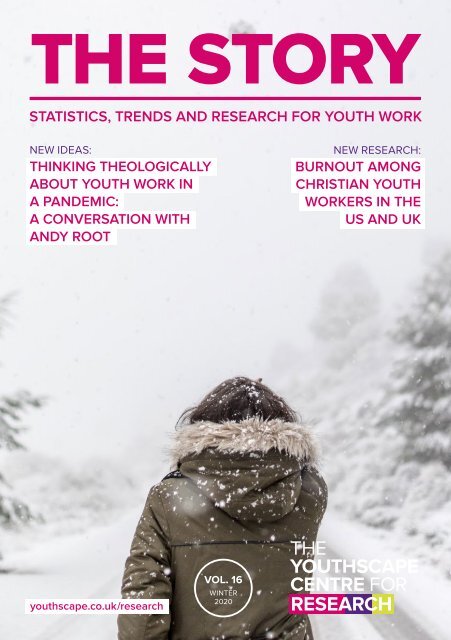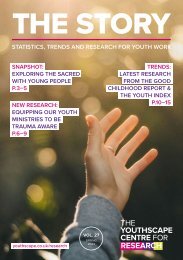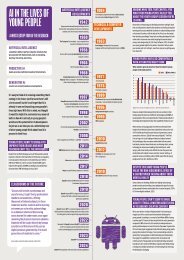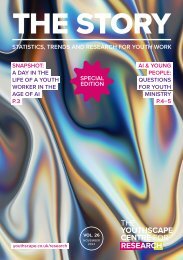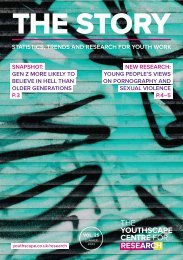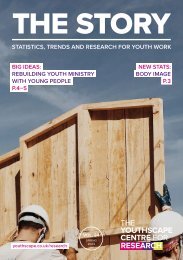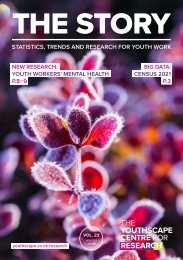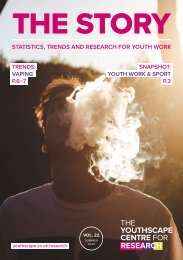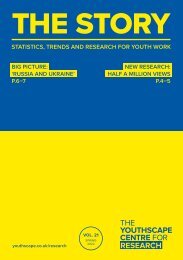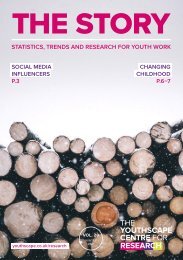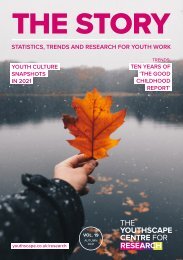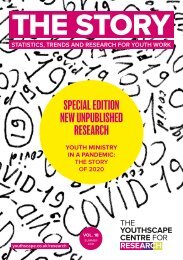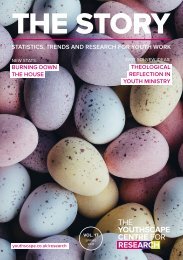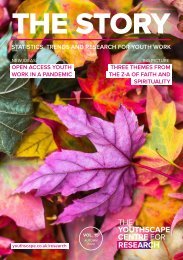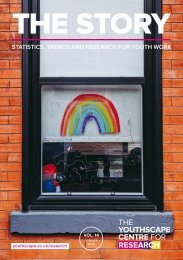The Story Vol 16
Youth leader burnout. A theology of youth work in a pandemic. The aspiration gap. An introduction to systemic racism.
Youth leader burnout. A theology of youth work in a pandemic. The aspiration gap. An introduction to systemic racism.
You also want an ePaper? Increase the reach of your titles
YUMPU automatically turns print PDFs into web optimized ePapers that Google loves.
THE STORY<br />
STATISTICS, TRENDS AND RESEARCH FOR YOUTH WORK<br />
NEW IDEAS:<br />
THINKING THEOLOGICALLY<br />
ABOUT YOUTH WORK IN<br />
A PANDEMIC:<br />
A CONVERSATION WITH<br />
ANDY ROOT<br />
NEW RESEARCH:<br />
BURNOUT AMONG<br />
CHRISTIAN YOUTH<br />
WORKERS IN THE<br />
US AND UK<br />
youthscape.co.uk/research<br />
VOL. <strong>16</strong><br />
WINTER<br />
2020
WELCOME TO<br />
THE STORY<br />
To be notified about new issues or<br />
subscribe for printed copies visit<br />
www.youthscape.co.uk/research/<br />
the-story<br />
In each issue of <strong>The</strong> <strong>Story</strong> we bring you<br />
some of the latest research related to<br />
young people and youth work. We look<br />
for statistics, research and trends which<br />
can shape your work with young people –<br />
informing your thinking and practice.<br />
IN THIS ISSUE:<br />
NEW RESEARCH<br />
<strong>The</strong> Aspiration Gap<br />
P.3<br />
After many months, we know this<br />
pandemic has taken a huge toll. New<br />
research from <strong>The</strong> Prince’s Trust highlights<br />
how important it is to hold hope for young<br />
people who feel their future is being<br />
robbed (page 3). As we enter a second<br />
lockdown, Phoebe Hill and Andy Root<br />
have been wrestling with the theological<br />
implications of online youth work and<br />
we’ve shared some of the highlights of<br />
their conversation on pages 4-5. It also<br />
feels very timely to be sharing insights<br />
from research by Len Kageler and<br />
colleagues, on avoiding or managing<br />
burnout if you are a youth worker (pages<br />
6-7). Finally, our poster begins to explore<br />
some of the key concepts helping us<br />
reflect on racism and learn more about<br />
how to be anti-racist in our youth work.<br />
Thank you to all those whose efforts are<br />
making this learning possible.<br />
Lucie Shuker<br />
Director of Research, Youthscape<br />
NEW IDEAS<br />
Thinking theologically about<br />
youth work in a pandemic:<br />
a conversation with Andy Root<br />
NEW RESEARCH<br />
Burnout among Christian Youth<br />
Workers in the US and UK<br />
YOUTH WORK DIAGRAMS<br />
How to Hygge<br />
AN INTRODUCTION TO…<br />
SYSTEMIC RACISM<br />
Research News<br />
P.4–5<br />
P.6–7<br />
P.8<br />
REVERSE<br />
New on the blog: You’ll find a range<br />
of articles at www.youthscape.co.uk/<br />
research/news including all the results<br />
from our weekly 3x3 lockdown surveys,<br />
and reflections on youth work, research<br />
and theology.<br />
Coming soon: We’ve now finished a new<br />
report on <strong>The</strong>ological Reflection in youth<br />
work, which we hope to launch very soon.<br />
Thanks to all those who took part in our<br />
survey!<br />
P.2
NEW RESEARCH<br />
<strong>The</strong> Aspiration Gap<br />
In the first two weeks of September 2020<br />
<strong>The</strong> Prince’s Trust surveyed 2000 <strong>16</strong>-25 yearolds,<br />
of whom 625 were ‘Not in Education,<br />
Employment or Training’ (NEET) or had received<br />
free school meals during school (described as<br />
‘those from poorer homes’ in the report). 1 <strong>The</strong><br />
findings suggest that for older youth, there<br />
were significant feelings of hopelessness as<br />
they re-entered education, and that these were<br />
more keenly felt among those from poorer<br />
backgrounds or who were NEET.<br />
44% said their aspirations for the future are<br />
now lower as a result of the pandemic.<br />
More than a third (36%) believed they will have<br />
a “lower quality of life” than their parents,<br />
while 46% claimed their generation will have<br />
fewer opportunities.<br />
41% believed their future goals now seem<br />
“impossible to achieve” (50% of those from<br />
poorer backgrounds).<br />
38% felt they will “never succeed in life” (48%<br />
of those from poorer homes).<br />
More than one in three (36%) said they have<br />
“lost hope” for the future.<br />
55% said the pandemic had made them fearful<br />
for their future, and 46% said thinking about<br />
their future made them feel “hopeless”.<br />
Of the 861 young people surveyed who were in<br />
school, college or university:<br />
41% worried the education they’ve missed will<br />
set them back for the rest of their life (50% of<br />
those from poorer backgrounds).<br />
More than a third (39%) felt that their education<br />
has now “gone to waste” (rising to 47% of<br />
those from poorer backgrounds).<br />
41% worried that other young people have had<br />
tutors or more help than them (47% among<br />
those from poorer homes).<br />
More than half (54%) say they feel pressure<br />
to work “even harder” because of the school<br />
they’ve missed.<br />
Statistics like these can be challenging to read,<br />
but there are lots of people making a real<br />
difference. Here’s Becky Harding, Lead Coach<br />
on the Spear Programme.<br />
On the Spear Programme we are passionate<br />
about equipping and empowering young<br />
people into work or further training in order<br />
to succeed in their career. We work with<br />
unemployed <strong>16</strong>-24-year-olds across the UK,<br />
who often come from more disadvantaged<br />
backgrounds. Katy 2 came to our first Spear<br />
Brighton online programme in August. She was<br />
suffering with poor mental health and addiction<br />
and was unemployed. Katy completed the<br />
programme and at the celebration event said,<br />
“<strong>The</strong> Spear Programme has taught me that we<br />
are always going to have obstacles in our life<br />
– but we can always get through them. It’s not<br />
about where we come from, but where we go<br />
from there’’. Katy is now at college in London<br />
studying Fashion Retail and is actively seeking<br />
part-time work.<br />
<strong>The</strong> youth unemployment statistics are stark,<br />
overwhelming and sometimes frustrating,<br />
especially in the wake of the pandemic, but<br />
young people are resilient and determined. In<br />
the midst of such uncertainty, there is hope to<br />
be found.<br />
1. Responses were weighted to be representative of all <strong>16</strong> to 25 year-olds in the UK, but no further information was<br />
available about how this was achieved. 2. Not her real name.<br />
P.3
NEW IDEAS<br />
Thinking theologically about youth work in a<br />
pandemic: a conversation with Andy Root<br />
Over the course of a few<br />
weeks, Youthscape’s<br />
Phoebe Hill and leading<br />
youth ministry thinker and<br />
theologian Andy Root sent<br />
each other a series of voice<br />
memos about theology and<br />
youth work in a pandemic.<br />
Here are some highlights of<br />
their conversation…<br />
PHOEBE: Hey Andy! On the Youthscape<br />
podcast recently we ended up talking<br />
about theological perspectives on online<br />
youth work. 3 We talked about what you<br />
wrote (all those years ago!) in Revisiting<br />
Relational Youth Ministry, about God being<br />
in the midst of the youth work relationship.<br />
<strong>The</strong> question I posed in the podcast and<br />
wanted to pose to you is whether or not<br />
you see ‘place-sharing’ translating directly<br />
into an online domain?<br />
ANDY: Hey Phoebe. I’ve thought quite a<br />
bit about place-sharing which for me is the<br />
manifest place where the concreteness<br />
of revelation happens. So can that<br />
happen across zoom or some other kind<br />
of digital space? Scottish theologian Tom<br />
Torrance thinks that space is based in<br />
relational dynamics. So relationships can<br />
actually make a space. <strong>The</strong> question then<br />
becomes: can digital technology be a<br />
space for encounter with the presence of<br />
God? Thinking about it in the context of<br />
zoom – I think that zoom has all the suck<br />
factor of meetings in it. It allows meetings<br />
to happen, but there’s none of the spirit.<br />
<strong>The</strong> encounter of the human spirit is much<br />
harder across zoom. I am sceptical about it<br />
because studies have said that one of the<br />
things that happens on zoom is that you<br />
can’t help looking at yourself. <strong>The</strong>y think<br />
this is one of the driving engines of zoom<br />
fatigue, that you are watching yourself.<br />
That creates a fundamentally different<br />
kind of space if I’m always watching myself<br />
have a conversation. What does that<br />
mean theologically? It feels that there is<br />
something theologically at stake.<br />
<strong>The</strong> other side of this is that my wife<br />
is a pastor and has a woman in her<br />
congregation who was diagnosed with<br />
cancer out of the blue. To walk with them<br />
through this she is doing morning and<br />
evening prayer every night with them. This<br />
would simply not be possible without zoom.<br />
So there’s a certain way in which zoom is<br />
creating space for prayer to happen.<br />
3. Episode 181, https://www.youthscape.co.uk/podcast<br />
P.4
PHOEBE: When it comes to digital<br />
technology, there’s this narrative where<br />
‘the Church has always been behind<br />
culture’ and ‘we need to be ahead of the<br />
curve this time’. <strong>The</strong>re’s a sense of hostility<br />
towards anything that isn’t overly positive<br />
towards technology. What you said about<br />
there being something theologically at<br />
stake feels so true. But it’s broader than<br />
just where God is present, it’s also about<br />
asking: what is digital technology doing to<br />
our humanity?<br />
ANDY: One of the things I’ve been working<br />
on for volume 3 of the Secular Age series<br />
is this sense that there’s always someone<br />
who keeps time for us. As human beings<br />
historically, you need somebody or some<br />
larger institution that keeps time. For most<br />
of western history that was the Church.<br />
But one of the big revolutions of modernity<br />
is to say that it doesn’t want the Church<br />
to keep time any more. It’s a longer story,<br />
but the interesting thing is that Silicon<br />
Valley now keeps time for us. It is just as<br />
oppressive in some ways. So what I’m<br />
picking up when people are saying that<br />
the Church is so behind and we need to<br />
catch up – that really is a Silicon Valley<br />
view. This idea that the only businesses<br />
that will survive are the ones that can<br />
quickly innovate, so you have to disrupt<br />
very quickly and live in a state of insecurity<br />
– you have to go fast. So when pastors<br />
say things like ‘we have to change change<br />
change’ – we hear that and we feel that it<br />
makes sense because we live under the<br />
tyranny of Silicon Valley’s accelerated view<br />
of time.<br />
PHOEBE: I wrote a blog for the<br />
Youthscape website about the challenge<br />
of faith formation in a time when we<br />
can’t meet together. I talked a bit about<br />
performativity and restrictions on the<br />
normal practices of a youth group like<br />
praying out loud and singing out loud and<br />
reading the Bible together. What kind of<br />
impact might that have on faith formation?<br />
ANDY: <strong>The</strong>re are lots of things we can’t<br />
do, but to me one of the core elements we<br />
can do that’s very important and is a major<br />
river that pours into faith formation, is to<br />
invite young people to interpret stories.<br />
Particularly to invite young people into<br />
stories of what God’s responsibility is in<br />
this. Even stories of people in their faith<br />
communities who have prayed for healing,<br />
or prayed and didn’t find healing. And then<br />
trying to make sense of that. Maybe they<br />
could make little videos, and they could<br />
share them with people and start to reflect<br />
together. Faith formation is dependent on<br />
narrative, and one of the ways it becomes<br />
incarnate is that there are embodied<br />
people who live this faith out, and their<br />
stories are the way they transfer their lived<br />
experience to us.<br />
What do you make of this?<br />
We’d love to hear your own<br />
theological reflections on<br />
what it’s like to do youth work<br />
online at @YWResearch or at<br />
research@youthscape.co.uk<br />
P.5
NEW RESEARCH<br />
Burnout among Christian<br />
youth workers in the US<br />
and UK 4<br />
Dr Len Kageler<br />
Nyack College, New York 5<br />
This study explored how youth workers in<br />
the US and UK experience and recover from<br />
burnout. An anonymous online survey was<br />
shared with youth workers through five youth<br />
ministry resource providers, and those taking<br />
the survey had experienced youth ministry<br />
burnout or had detailed knowledge of<br />
someone who experienced burnout.<br />
What contributes to burnout?<br />
Respondents were asked to choose up<br />
to four (out of 11 choices) of possible<br />
contributors to their own burnout.<br />
Feeling isolated or lonely, spiritual<br />
dryness, pastor/supervisor hard to get<br />
along with, and too much criticism were<br />
the top four items named by these US<br />
and UK youth workers.<br />
Of the 123 valid responses, 90 were from the<br />
US and 33 were from the UK. <strong>The</strong> results can’t<br />
be generalised to all youth workers but will<br />
be of interest to and relevant to both youth<br />
workers and those who seek to train them.<br />
Leaving ministry<br />
Of those experiencing burnout, 51 of the 123<br />
did not recover and did not re-enter vocational<br />
ministry, with the vast majority of these<br />
expressing no intention to return to ministry or<br />
lead in volunteer roles. <strong>The</strong> four who left paid<br />
ministerial work and stepped into volunteer<br />
roles moved areas of ministry or changed<br />
churches when moving to a volunteer basis.<br />
Comments were provided like “still loves kids<br />
but doesn’t have to deal with the bureaucracy”<br />
and, wanted to work at a “slower pace”.<br />
Recovery and return<br />
<strong>The</strong> survey also asked respondents to<br />
describe their recovery from burnout and their<br />
choice to stay in youth ministry. <strong>The</strong> majority<br />
of those experiencing burnout re-entered<br />
or stayed in ministry (n=72). <strong>The</strong>se recovery<br />
stories described a variety of paths toward<br />
return to ministry, which are outlined here.<br />
FELT ISOLATED OR LONELY<br />
SUPERVISOR RELATIONSHIP<br />
SPIRITUAL DRYNESS, AN UNNOURISHED SOUL<br />
FINANCIAL PRESSURES<br />
GREW WEARY OF SPENDING TIME WITH YOUTH<br />
FEELINGS OF PERSONAL DISORGANIZATION<br />
STRAINED FAMILY RELATIONS<br />
FEELING UNQUALIFIED FOR THE JOB<br />
GROWING LOSS OF CONFIDENCE<br />
TOO MUCH CRITICISM<br />
FEELINGS OF PERSONAL INADEQUACY<br />
OTHER<br />
0% 10% 20% 30% 40% 50%<br />
P.6
A significant break/sabbatical/vacation/<br />
unemployment<br />
<strong>The</strong> most common recurring theme in the<br />
stories of burnout recovery was that of<br />
sabbatical. Widely described as “extended<br />
vacation,” “significant break,” “time off/<br />
out,” “unemployment,” “work leave,”<br />
and “sabbatical.” Some kind of break or<br />
sabbatical, voluntary or involuntary, was<br />
mentioned by one third of all who reported<br />
eventual recovery. <strong>The</strong>se proactive<br />
sabbaticals were most often initiated by a<br />
mentor or pastor’s direct intervention based<br />
on what they observed in the individual’s life.<br />
Professional help/counselling<br />
Almost a fifth (19%) of those who eventually<br />
recovered from burnout and returned to<br />
ministry received some form of counselling.<br />
While a relatively low percentage, it was the<br />
second most common recovery element<br />
among the participants. <strong>The</strong> counselling<br />
focused on a variety of topics including<br />
forgiveness, self-care, accountability, calling,<br />
dealing with loss, and boundaries. Some form<br />
of encouragement from leadership, pastor,<br />
or mentor was often connected to receiving<br />
counselling and thus staying in ministry.<br />
Delegation<br />
Delegation was a form of lightening the load<br />
and involving others in the work. For this<br />
subgroup, burnout ultimately resulted in more<br />
people doing the work of ministry and more<br />
equitable workloads, which is a fundamental<br />
strategy for health in the ministry. Delegation<br />
was often connected to other comments<br />
about “letting go,” or “removing things from<br />
my life.” <strong>The</strong>se comments fall under the<br />
idea of setting boundaries: self-imposed<br />
limits that define one’s sphere of work and<br />
responsibility. One respondent stated: “I’ve<br />
started saying no to things that are not<br />
directly within my responsibilities.”<br />
Soul care and spiritual disciplines<br />
Many of the changes or elements described<br />
enabled the youth worker to engage with<br />
God in new or deeper ways. For example,<br />
Sabbath provided space and mentors<br />
provided modelling for the practice of<br />
neglected spiritual disciplines. While<br />
disciplines themselves are not merit bearing,<br />
they place the participant in a path to meet<br />
God and grow.<br />
Network support<br />
Ministry partnerships and friendships were<br />
listed as major causes of perseverance,<br />
reaffirmed calling, encouragement, challenge,<br />
accountability, support and prayer. One<br />
participant put it well: “Friendships built<br />
among the youth leaders enabled us to talk<br />
and encourage each other through these<br />
times. We prayed for and carried each other<br />
in bad times.” While other factors above<br />
were often described as playing a part in<br />
recovering from burnout, these networks<br />
of support were, as one person put it, “the<br />
reason I stayed in the ministry.”<br />
So what does this mean?<br />
Some youth workers in their high desire to<br />
follow God’s calling on their lives begin their<br />
ministries fired up with enthusiasm but end<br />
up discouraged, exhausted, and in despair.<br />
This study has highlighted some of the pitfalls<br />
that may lead to burnout. Proceeding as a<br />
youth worker with some awareness of these<br />
pitfalls should contribute to avoiding burnout<br />
yourself, as well as helping other youth<br />
workers who are at risk of burnout too.<br />
4. For a full copy of the paper please contact research@youthscape.co.uk 5. <strong>The</strong> other authors of the study were Dr<br />
Mike Severe, Taylor University, Indiana and Faith Argeropolis, Nyack College, New York.<br />
P.7
YOUTH WORK DIAGRAMS<br />
How to Hygge<br />
NUDITY IN<br />
SAUNA<br />
THANKS<br />
GIVING<br />
VERY HYGGE/<br />
COSY<br />
HOT WATER<br />
BOTTLES<br />
Research team member Gry is a<br />
Norwegian living in England.<br />
Here is her bi-cultural guide to<br />
staying cosy this winter.<br />
DAVID<br />
ATTENBOROUGH’S<br />
VOICE<br />
SKIING INTO THE<br />
MOUNTAINS AND<br />
STAYING IN A<br />
CABIN WITHOUT<br />
ELECTRICITY<br />
CANDLES<br />
BLANKETS<br />
BONFIRE<br />
NIGHT<br />
STICKY<br />
TOFFEE<br />
PUDDING<br />
SUNDAY ROAST<br />
IN THE PUB BY A<br />
ROARING FIRE<br />
NOT VERY<br />
BRITISH<br />
VERY<br />
BRITISH<br />
EYE CONTACT<br />
WITH STRANGERS<br />
ON THE TUBE<br />
NUDITY<br />
IN THE<br />
STREETS<br />
DISORDERLY<br />
QUEUING<br />
ICED TEA<br />
CUCUMBERS<br />
GOING TO<br />
A FOOTBALL<br />
MATCH<br />
WAITING FOR<br />
A BUS IN THE<br />
RAIN<br />
GRITTY<br />
SOCIAL REALIST<br />
DRAMA<br />
PASSIVE<br />
AGGRESSIVE<br />
COMMENTS<br />
NOT VERY<br />
HYGGE/COSY<br />
For more #youthworkdiagrams follow us on Twitter @YWresearch<br />
Bute Mills, 74 Bute Street,<br />
Luton, LU1 2EY<br />
TWITTER POLL: WHERE IN THE WORLD?<br />
Yes, we’re not going anywhere, but that doesn’t mean we can’t<br />
dream.* If you could be anywhere right now, where would you<br />
like to be? Our Fantasy Getaway Twitter Poll (n=31) decisively<br />
settles the question of youth workers’ holiday preferences.<br />
hello@youthscape.co.uk<br />
01582 877220<br />
Registered charity no. 1081754.<br />
Registered company no. 3939801<br />
registered in England, a company<br />
limited by guarantee.<br />
P.8<br />
FRYING ON<br />
A BEACH<br />
(48.4%)<br />
31 VOTES<br />
ROAMING<br />
A NEW CITY<br />
(29%)<br />
THERE’S NO PLACE<br />
LIKE HOME<br />
(<strong>16</strong>.1%)<br />
WHIZZING DOWN<br />
A MOUNTAIN<br />
(6.5%)<br />
*...and with Google Street View your dreams can almost come true.


